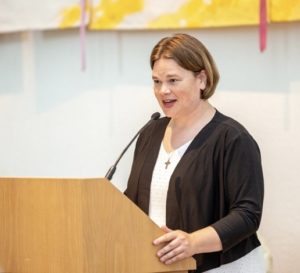
“Joy to the world! Let heaven and nature sing!”
Like me, you probably sang these words during the recent celebration of Christmas – the Christian holiday more accurately described as the Feast of the Incarnation.
Christmas celebrates God becoming flesh. And not just any flesh, but the flesh of a tiny, vulnerable infant who needed – in the words of Denise Levertov’s poem “Annunciation” – “milk and love.” The Creator of the Universe, the Source of All Being takes the risk of becoming a baby in this messy, beautiful world. It is a wild claim so difficult to wrap our finite minds around that we need to practice believing it every year.
This year my meditation on the good news of God’s incarnation has been shaped by research on the role of Jesus in the New Cosmology. Our universe is posited to be 13.8 billion years old – if God became human in Jesus of Nazareth a mere 2,000 or so years ago, where does that leave the rest of history?
And if God uniquely took on human flesh, where does that leave the non-human elements of creation?
How is Christmas not just joy to humans, but joy to the world – or even to the whole universe?
According to Franciscan theologian Ilia Delio, Bonaventure (following early Greek fathers) “did not consider the incarnation foremost as a remedy for sin but the primacy of love and the completion of creation… Christ is the redeeming and fulfilling center of the universe.” (Christ in Evolution, 6) If we really internalize the truth, how are our image of “God with us” and theological anthropology transformed?
These questions of the relationship between the Incarnation and all of creation seem urgent given our current climate crisis and Pope Francis’ call in Laudato Si’ for all people of good will to undergo ecological conversion.
Perhaps the beginning of an answer to these questions is “deep incarnation,” a term coined in 2001 by Lutheran theologian Niels Henrik Gregerson and developed by several other contemporary theologians who are in dialogue evolutionary biology.
Gregersen offers this definition in his article “The Extended Body of Christ,” quoted in Denis’ Edwards’ book Deep Incarnation: God’s Redemptive Suffering With Creatures (a text I highly recommend).
“’Deep incarnation’ is the view that God’s own Logos (Wisdom and Word) was made flesh in Jesus the Christ in such a comprehensive manner that God, by assuming the particular life story of Jesus the Jew from Nazareth, also conjoined the material conditions of creaturely existence (‘all flesh’), shared and ennobled the fate of all biological life forms (‘grasses’ and ‘lilies’) and experienced the pain of sensitive creatures (‘sparrows’ and ‘foxes’) from within.”
In Ask the Beasts: Darwin and the God of Love, Johnson echoes and further develops Gregersen’s presentation of deep incarnation, writing:
“Deep incarnation extends this view to include all flesh. In the incarnation of Jesus, the self-expressing Wisdom of God, conjoined the material conditions of all biological life forms (grasses and trees), and experienced the pain common to all sensitive creatures (sparrows and seals). The flesh assumed in Jesus connects with all humanity, all biological life, all soil, the whole matrix of the material universe down to its very roots.” (196)
As I unpack those two quotations, it seems that in the very particular enfleshing of God in a very particular first century Palestinian Jewish infant at a very particular time and place, all sentient and non-sentient beings have been assumed in the mystery of God’s merciful, compassionate accompaniment.
Can it be that not just the whole Earth but the whole immensity of the cosmos – black holes and protostars, nebulae and dark matter – are transformed through the mystery we sing of in that little town of Bethlehem? Can it be that Christ, the firstborn of all creation (Colossians 1:15), is intimately present among not just human flesh but the entire universe – or even universes?
Though the term “deep incarnation” isn’t even twenty years old yet, I would be remiss if I didn’t acknowledge that theologians have been pondering what the incarnation means for all flesh and for all of creation since the earliest Church Fathers. Edwards delves into the thought of two of them – Irenaeus and Athanasius – in his book Deep Incarnation.
St Irenaeus of Lyons (c 130-198) opposed the Marcionite heresy which denigrated matter and called for a flight from the world. Irenaeus consistently preached the goodness of creation, defending earthiness and resisting impulses towards theological disembodiment.
St Athanasius (c 296-373) opposed heresies of his time as well, developing the idea that the Incarnation calls humans to divinization and naming Christ as “the Liberator of all flesh and of all creation” (following Paul in Romans 8:21).
As a Dominican Sister, I of course would add to these two the joyful friar St Dominic, who preached against the Albigensian heresy which separated spirit from matter.
A line of continuity can be drawn from these thinkers to Gregersen, Johnson, and other theologians developing “deep incarnation.” These are simply a few rough initial musings, and I invite your response in the comments with a “yes, and…” or “well, have you thought of…?”
What possibilities do you sense in “deep incarnation” that could help to develop a needed “preferential option for the planet” in this time of climate crisis? How does “deep incarnation” break open for you the Christmas story in a new and life-giving way?

A note to commentators from Sr Laurie Brink, OP: I am a Catholic Christian scholar for whom the Gospel directs not only my teaching, but my actions and hopefully my speech. I look forward to your insights, and I ask that in the spirit of Christian charity and courteous discourse you write with love and civility. Hateful or vitriolic speak has no place in thoughtful dialogue.
“Let no evil talk come out of your mouths, but only what is useful for building up, as there is need, so that your words may give grace to those who hear” (Eph 4:29).